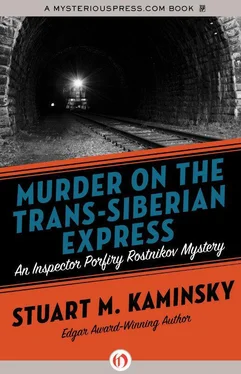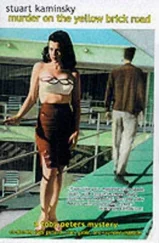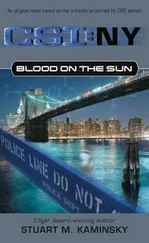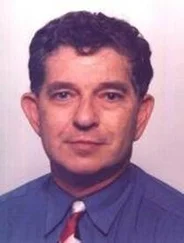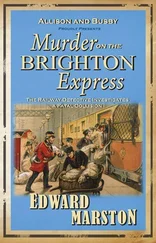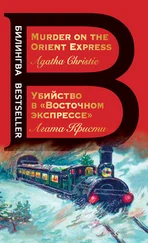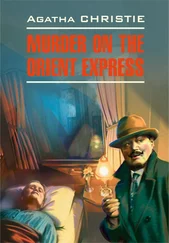Stuart Kaminsky - Murder on the Trans-Siberian Express
Здесь есть возможность читать онлайн «Stuart Kaminsky - Murder on the Trans-Siberian Express» весь текст электронной книги совершенно бесплатно (целиком полную версию без сокращений). В некоторых случаях можно слушать аудио, скачать через торрент в формате fb2 и присутствует краткое содержание. Год выпуска: 2012, Жанр: Полицейский детектив, на английском языке. Описание произведения, (предисловие) а так же отзывы посетителей доступны на портале библиотеки ЛибКат.
- Название:Murder on the Trans-Siberian Express
- Автор:
- Жанр:
- Год:2012
- ISBN:нет данных
- Рейтинг книги:3 / 5. Голосов: 1
-
Избранное:Добавить в избранное
- Отзывы:
-
Ваша оценка:
- 60
- 1
- 2
- 3
- 4
- 5
Murder on the Trans-Siberian Express: краткое содержание, описание и аннотация
Предлагаем к чтению аннотацию, описание, краткое содержание или предисловие (зависит от того, что написал сам автор книги «Murder on the Trans-Siberian Express»). Если вы не нашли необходимую информацию о книге — напишите в комментариях, мы постараемся отыскать её.
Murder on the Trans-Siberian Express — читать онлайн бесплатно полную книгу (весь текст) целиком
Ниже представлен текст книги, разбитый по страницам. Система сохранения места последней прочитанной страницы, позволяет с удобством читать онлайн бесплатно книгу «Murder on the Trans-Siberian Express», без необходимости каждый раз заново искать на чём Вы остановились. Поставьте закладку, и сможете в любой момент перейти на страницу, на которой закончили чтение.
Интервал:
Закладка:
“Gentlemen,” he said in English to the other three people in his compartment as he zipped the duffel closed and deposited it casually on the rack over his head. “I asked a young friend of mine who his father was. He answered, ‘Comrade Putin.’ I asked who his mother was. He answered, ‘Russia.’ I asked him what he would like to be when he grows up. He answered, ‘An orphan.’”
The two old Americans laughed and Pavel immediately said, “Two Jewish women meet on Kalinin Street. One is holding the hands of her two little boys. ‘Well,’ says the one woman, ‘how old are your children?’ And the other woman answers, ‘The doctor is six. The lawyer is four.’”
Again his compartment mates laughed.
Pavel had many more. He put any thoughts of Porfiry Petrovich Rostnikov in a little mental box to be opened when he did not have a willing audience.
In 1904 the Japanese attacked and defeated the Russian fleet in the Sea of Japan at Port Arthur, near Vladivostok. Troops had to be sent to the front to protect the coast of Siberia. The Trans-Siberian Railroad could handle only thirteen trains a day. The czar ordered the elimination of civilian services on the line. Transferring troops was also hampered because a portion of the Circum-Baikal section of the line had to be used. Part of that line, the connection of the west and east coasts of Baikal Lake, was not completed. Trains were ferried on a 3,470-ton icebreaker called Baikal, which could carry up to 25 loaded cars at a time. When winter came and the lake froze Siberian-solid, tracks were laid across it and 220 cars a day rattled across. There are no reports of the ice giving way.
After the war with Japan, the czar ordered an increase in the capacity of the Trans-Siberian Railroad. To increase the speed of the trains, the earth bed was widened, light rails were replaced by heavier ones, rails were laid on metal plates instead of wood, wooden bridges were torn down and replaced by others of concrete and metal. A second track was begun in 1909 and completed in 1913. New branches were also built.
By 1912, 3.2 million passengers traveled on the Trans-Siberian Express, but during World War I the Russian railway system, suffering from shortages, began to break down. It was further devastated by the Russian civil war. Cars and locomotives were destroyed, bridges were burned, and passenger stations bombed.
When the czar was overthrown and the White Army defeated, rebuilding began. During the winter of 1924–1925, the badly damaged Amur Bridge was rebuilt. In March of 1925, traffic on the railroad was opened again. It has not once been interrupted in more than seventy-five years.
Porfiry Petrovich bypassed his compartment, where the three men were drinking and laughing. He considered joining them to work on his English, but he knew there would be time for that and that his English was certainly passable.
He found the dining car. It was almost empty. People were settling into their compartments. The dining-car seats were comfortable. Through the windows he could see the last lights of the outskirts of Moscow growing more apart and more dim and small.
He took the Ed McBain novel out of his pocket and began to read. He would have liked to remove his leg but that would have to wait till he returned to his compartment, where he would immediately tell the others how he had lost it. The two old men with whom he shared his compartment had mentioned that they were veterans of World War II. They might want to discuss their own experiences, but then again they might not. Rostnikov’s explanation of his own participation in the war was always short and precise. It invited no conversation but discouraged no comment.
“I was a child,” he said. “A very young boy soldier. I made a mistake and my leg was run over by a German tank. The ground was muddy. The leg would not die. Not long ago it was necessary to remove it.”
Story done. He did not want to go into details. Most who had served in an army did not press him.
He planted both his good and his artificial leg on the floor and opened his book. The train jostled, but he was not prone to motion sickness.
There were a few others in the car, a couple in their late thirties or early forties talking softly in Russian, pointing out the window. A woman of about fifty, slight, thick glasses, alone, sat with her elbow bent on the train seat and her head resting upon her hand. She looked sadly and deeply into the night.
Rostnikov was absorbed in the text of the ragged paperback. The Deaf Man was killing people again, confounding Carella and the others. Rostnikov did not wonder if he would be caught. He knew. He had read the novel three times before.
Even absorbed in the book he was aware that someone had sat across from him. He did not take his eyes from the page but he could see the figure of a woman, sense her presence and perhaps the faint smell of perfume. When he finished the chapter, Rostnikov looked up.
The woman was about forty, lean, wearing a tan skirt and blouse. She was quite beautiful. She was looking directly at him. She smiled. Rostnikov smiled back.
Over the woman’s shoulder Porfiry Petrovich saw Sasha Tkach enter the car. Rostnikov blinked his eyes once without looking at Sasha. The blink was enough. Sasha understood. He backed out of the car.
“Are you traveling alone?” the woman asked in Russian in a surprisingly deep voice.
“Yes,” he answered. “And you?”
“The same,” she said. “I think I know you.”
“I think that not likely,” he said. “I know I should remember you if we had met.”
“Thank you,” she said, widening her smile and holding out her hand. “I am Svetlana Britchevna.”
Rostnikov leaned over somewhat awkwardly. Her skin was tender but her grip was firm.
“I am Ivan Pavlov,” he said.
“Forgive me,” she said. “I’m a bit forward, I know, but I anticipate a boring trip and the more interesting people with whom I can converse the more quickly the time will pass.”
“The scenery during the day is supposed to be magnificent,” he said.
“I know,” she answered, straightening her skirt. “I’ve seen it many times. I travel the line frequently, three or four times a year. I’m an engineer. Electrical. Safety checks on various plants throughout Siberia. There are no stops on the line of any great interest to me till we get to Novosibirsk.”
“Nothing of interest is likely to happen before then?” asked Rostnikov.
“I speak from experience,” she said pleasantly. “And you?”
“I have never traveled on this train before.”
“No,” she said with a smile. “I mean, what do you do?”
“I am a plumbing contractor,” Rostnikov said. “Not terribly interesting to others.”
“But you find it so,” she said.
“Yes.”
“As I find computer programs. You know about plumbing, then?”
He nodded.
“My husband and I have a problem,” she said, leaning forward as if she were about to share an intimate secret. “We have cast-iron drain pipes in our basement. They are rotting. Were planning a new fixture. Do we have to, should we, use galvanized iron again?”
“No,” Rostnikov said, putting his book in his pocket. “A no-hub fitting can get you into the stack, with minimum difficulty. With special adapter fittings, copper or plastic supply lines can take over where the galvanized leaves off. It can usually be accomplished with the right tools, some no-hub clamps, spacers, a few sanitary crosses, possibly a tee and a riser clamp, using the right tools.”
“I think we had better get a plumber,” she said.
“It is really not difficult,” Rostnikov said. “You live in Moscow?”
“Yes,” she said.
“I would be happy to come to your home and examine your problem.”
Читать дальшеИнтервал:
Закладка:
Похожие книги на «Murder on the Trans-Siberian Express»
Представляем Вашему вниманию похожие книги на «Murder on the Trans-Siberian Express» списком для выбора. Мы отобрали схожую по названию и смыслу литературу в надежде предоставить читателям больше вариантов отыскать новые, интересные, ещё непрочитанные произведения.
Обсуждение, отзывы о книге «Murder on the Trans-Siberian Express» и просто собственные мнения читателей. Оставьте ваши комментарии, напишите, что Вы думаете о произведении, его смысле или главных героях. Укажите что конкретно понравилось, а что нет, и почему Вы так считаете.
